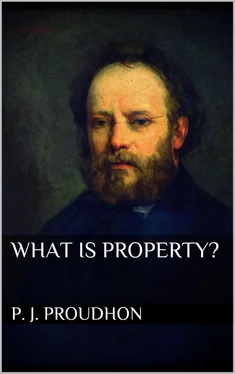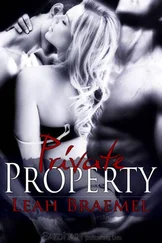In possession of the Suard pension, Proudhon took part in the contest proposed by the Academy of Besancon on the question of the utility of the celebration of Sunday. His memoir obtained honorable mention, together with a medal which was awarded him, in open session, on the 24th of August, 1839. The reporter of the committee, the Abbe Doney, since made Bishop of Montauban, called attention to the unquestionable superiority of his talent.
"But," says Sainte Beuve, "he reproached him with having adopted dangerous theories, and with having touched upon questions of practical politics and social organization, where upright intentions and zeal for the public welfare cannot justify rash solutions."
Was it policy, we mean prudence, which induced Proudhon to screen his ideas of equality behind the Mosaic law? Sainte Beuve, like many others, seems to think so. But we remember perfectly well that, having asked Proudhon, in August, 1848, if he did not consider himself indebted in some respects to his fellow-countryman, Charles Fourier, we received from him the following reply: "I have certainly read Fourier, and have spoken of him more than once in my works; but, upon the whole, I do not think that I owe anything to him. My real masters, those who have caused fertile ideas to spring up in my mind, are three in number: first, the Bible; next, Adam Smith; and last, Hegel."
Freely confessed in the "Celebration of Sunday," the influence of the Bible on Proudhon is no less manifest in his first memoir on property. Proudhon undoubtedly brought to this work many ideas of his own; but is not the very foundation of ancient Jewish law to be found in its condemnation of usurious interest and its denial of the right of personal appropriation of land?
The first memoir on property appeared in 1840, under the title, "What is Property? or an Inquiry into the Principle of Right and of Government." Proudhon dedicated it, in a letter which served as the preface, to the Academy of Besancon. The latter, finding itself brought to trial by its pensioner, took the affair to heart, and evoked it, says Sainte Beuve, with all possible haste.
The pension narrowly escaped being immediately withdrawn from the bold defender of the principle of equality of conditions. M. Vivien, then Minister of Justice, who was earnestly solicited to prosecute the author, wished first to obtain the opinion of the economist, Blanqui, a member of the Academy of Moral and Political Sciences. Proudhon having presented to this academy a copy of his book, M. Blanqui was appointed to review it. This review, though it opposed Proudhon's views, shielded him. Treated as a savant by M. Blanqui, the author was not prosecuted. He was always grateful to MM. Blanqui and Vivien for their handsome conduct in the matter.
M. Blanqui's review, which was partially reproduced by "Le Moniteur," on the 7th of September, 1840, naturally led Proudhon to address to him, in the form of a letter, his second memoir on property, which appeared in April, 1841. Proudhon had endeavored, in his first memoir, to demonstrate that the pursuit of equality of conditions is the true principle of right and of government. In the "Letter to M. Blanqui," he passes in review the numerous and varied methods by which this principle gradually becomes realized in all societies, especially in modern society.
In 1842, a third memoir appeared, entitled, "A Notice to Proprietors, or a Letter to M. Victor Considerant, Editor of 'La Phalange,' in Reply to a Defence of Property." Here the influence of Adam Smith manifested itself, and was frankly admitted. Did not Adam Smith find, in the principle of equality, the first of all the laws which govern wages? There are other laws, undoubtedly; but Proudhon considers them all as springing from the principle of property, as he defined it in his first memoir. Thus, in humanity, there are two principles,—one which leads us to equality, another which separates us from it. By the former, we treat each other as associates; by the latter, as strangers, not to say enemies. This distinction, which is constantly met with throughout the three memoirs, contained already, in germ, the idea which gave birth to the "System of Economical Contradictions," which appeared in 1846, the idea of antinomy or contre-loi.
The "Notice to Proprietors" was seized by the magistrates of Besancon; and Proudhon was summoned to appear before the assizes of Doubs within a week. He read his written defence to the jurors in person, and was acquitted. The jury, like M. Blanqui, viewed him only as a philosopher, an inquirer, a savant.
In 1843, Proudhon published the "Creation of Order in Humanity," a large volume, which does not deal exclusively with questions of social economy. Religion, philosophy, method, certainty, logic, and dialectics are treated at considerable length.
Released from his printing-office on the 1st of March of the same year, Proudhon had to look for a chance to earn his living. Messrs. Gauthier Bros., carriers by water between Mulhouse and Lyons, the eldest of whom was Proudhon's companion in childhood, conceived the happy thought of employing him, of utilizing his ability in their business, and in settling the numerous points of difficulty which daily arose. Besides the large number of accounts which his new duties required him to make out, and which retarded the publication of the "System of Economical Contradictions," until October, 1846, we ought to mention a work, which, before it appeared in pamphlet form, was published in the "Revue des Economistes,"—"Competition between Railroads and Navigable Ways."
"Le Miserere, or the Repentance of a King," which he published in March, 1845, in the "Revue Independante," during that Lenten season when Lacordaire was preaching in Lyons, proves that, though devoting himself with ardor to the study of economical problems, Proudhon had not lost his interest in questions of religious history. Among his writings on these questions, which he was unfortunately obliged to leave unfinished, we may mention a nearly completed history of the early Christian heresies, and of the struggle of Christianity against Caesarism.
We have said that, in 1848, Proudhon recognized three masters. Having no knowledge of the German language, he could not have read the works of Hegel, which at that time had not been translated into French. It was Charles Grun, a German, who had come to France to study the various philosophical and socialistic systems, who gave him the substance of the Hegelian ideas. During the winter of 1844-45, Charles Grun had some long conversations with Proudhon, which determined, very decisively, not the ideas, which belonged exclusively to the bisontin thinker, but the form of the important work on which he labored after 1843, and which was published in 1846 by Guillaumin.
Hegel's great idea, which Proudhon appropriated, and which he demonstrates with wonderful ability in the "System of Economical Contradictions," is as follows: Antinomy, that is, the existence of two laws or tendencies which are opposed to each other, is possible, not only with two different things, but with one and the same thing. Considered in their thesis, that is, in the law or tendency which created them, all the economical categories are rational,—competition, monopoly, the balance of trade, and property, as well as the division of labor, machinery, taxation, and credit. But, like communism and population, all these categories are antinomical; all are opposed, not only to each other, but to themselves. All is opposition, and disorder is born of this system of opposition. Hence, the sub-title of the work,—"Philosophy of Misery." No category can be suppressed; the opposition, antinomy, or contre-tendance, which exists in each of them, cannot be suppressed.
Where, then, lies the solution of the social problem? Influenced by the Hegelian ideas, Proudhon began to look for it in a superior synthesis, which should reconcile the thesis and antithesis. Afterwards, while at work upon his book on "Justice," he saw that the antinomical terms do not cancel each other, any more than the opposite poles of an electric pile destroy each other; that they are the procreative cause of motion, life, and progress; that the problem is to discover, not their fusion, which would be death, but their equilibrium,—an equilibrium for ever unstable, varying with the development of society.
Читать дальше












